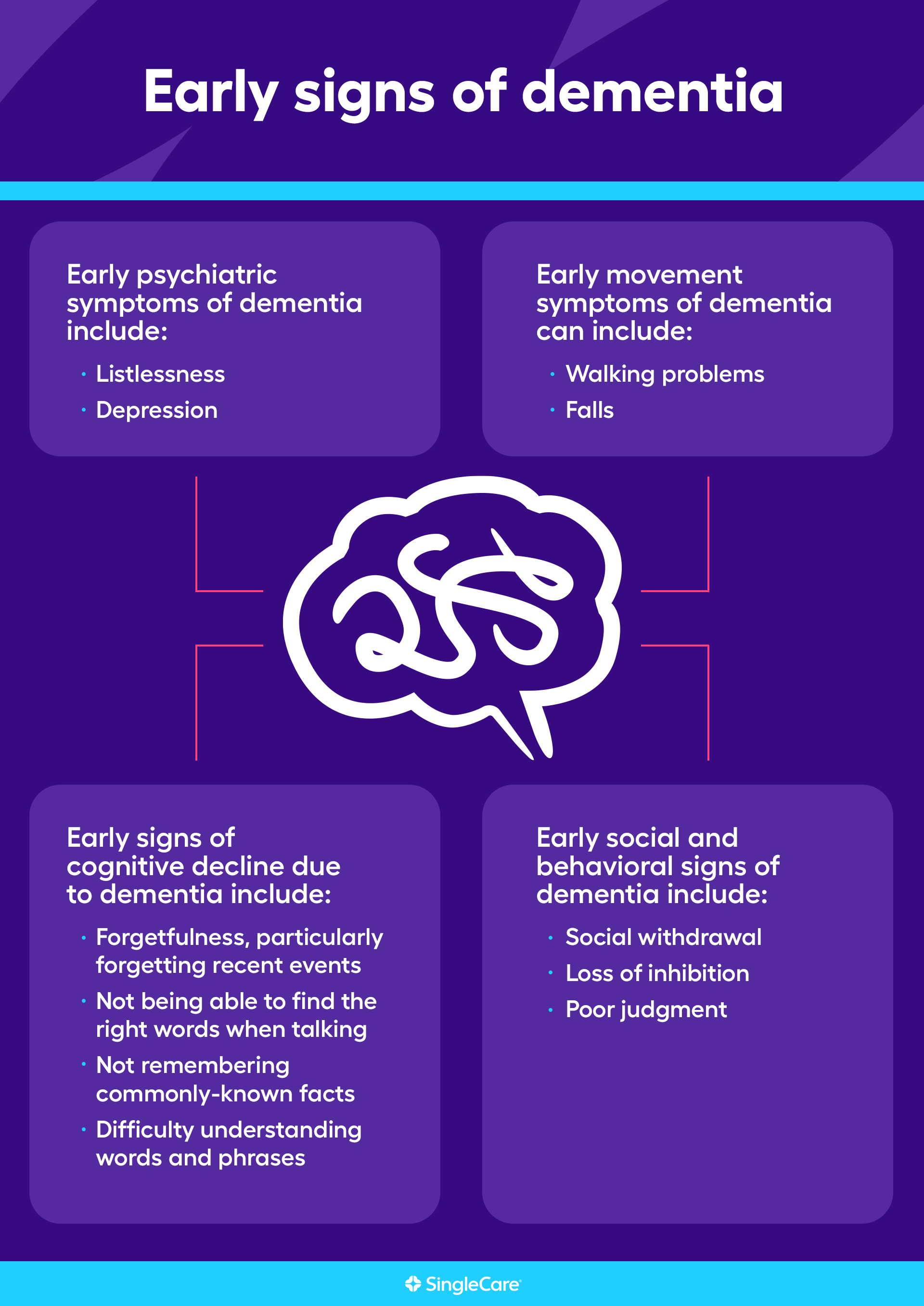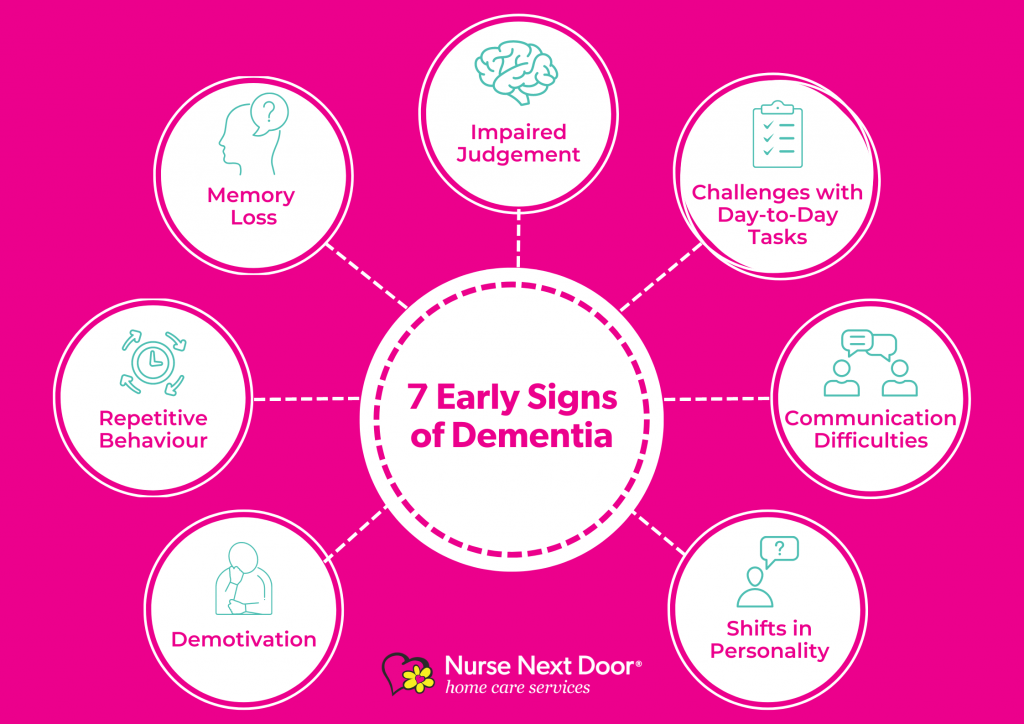Living Well After an Early Onset Dementia Diagnosis
Living Well After an Early Onset Dementia Diagnosis
Blog Article
Recognizing the Impact of Mental Deterioration on Life and Caregiving
Dementia affects day-to-day life in profound means, influencing not just those detected however additionally their caregivers. As cognitive decline advances, you could notice adjustments in interaction and routine that challenge both celebrations. Recognizing these changes is vital for maintaining self-respect and involvement. Just how do you adapt your caregiving strategies to sustain a person traversing this complex trip? The responses might surprise you as we discover the subtleties of this experience.
The Stages of Dementia and Their Results on Every Day Life
As you browse the journey of dementia, comprehending its phases can substantially influence exactly how you take care of day-to-day live. Dementia typically advances with 3 main stages: early, middle, and late. In the onset, you may see periodic memory lapses or trouble locating the right words. This can cause stress, yet acknowledging these indicators early aids you adapt your routine and look for assistance.
Throughout the middle phase, you'll experience much more recognizable cognitive decrease. Daily jobs may become challenging, and maintaining your independence might call for adjustments. Making use of reminders and simplifying your environment can help.
In the late stage, people typically require significant assistance with everyday activities. Preparation for care becomes essential, concentrating on convenience and high quality of life. By comprehending these stages, you're far better furnished to respond proactively, ensuring you or your enjoyed one can navigate the challenges with self-respect and poise.

Modifications in Interaction and Social Interaction
Exactly how do changes in interaction influence your day-to-day communications as dementia advances? As dementia advances, you might discover that simple discussions come to be difficult.
You may find it easier to connect through these methods as opposed to depending entirely on spoken language. Paying attention abilities can likewise transform; you may find it harder to adhere to discussions or remember what was simply said (Early Onset Dementia). This can result in misunderstandings or sensations of isolation
Encouraging perseverance and creating an encouraging environment can assist. Engaging in tasks that promote link, like music or art, can boost social communications. Remember, maintaining connections is still feasible; it's nearly adjusting to brand-new ways of interacting.
Effect On Daily Routines and Activities
While navigating day-to-day routines, you'll likely observe that jobs you once completed easily become extra challenging as dementia advances. Straightforward activities like cooking, clothing, or also bathing might call for even more effort and time. You may locate yourself forgetting actions in familiar regimens or having a hard time to recall where you put products. This can result in disappointment not simply for you, yet likewise for those around you.
Planning your day can feel overwhelming, making it harder to stay with a timetable. You might require reminders for consultations or to take medications. Adjusting your setting can assist; as an example, classifying items or using lists can streamline jobs. Participating in repetitive, structured activities can also provide comfort and a sense of accomplishment. Keep in mind, it's alright to ask for aid. Bordering on your own with helpful pals or household can make handling these changes a bit simpler.
Behavioral and psychological Difficulties
Steering with daily regimens can bring about not simply functional challenges, yet behavior and likewise emotional ones. You might see modifications in state of mind, such as enhanced anxiety or disappointment, which can stem from complication or difficulty in finishing tasks. As you browse these minutes, it is important to recognize that your liked one might express their sensations through habits like frustration or withdrawal.
These emotional responses can be unforeseeable and might occur without warning, leaving you both sensation overwhelmed. You may locate that familiar atmospheres or routines can help in reducing anxiety, however keeping patience ends up being significant. It is essential to confirm their feelings, even if you do not fully comprehend them.
The Function of Caregivers in Sustaining People With Dementia
As a caregiver, you play a crucial function in supplying psychological assistance for individuals with dementia. Establishing everyday treatment regimens can create a sense of security and convenience, aiding to ease their stress and anxiety. By recognizing their needs and utilizing reliable approaches, you can considerably boost their lifestyle.
Emotional Assistance Strategies
When caring for someone with dementia, comprehending the psychological landscape is crucial for supplying effective support. Simple gestures, like holding their hand or preserving eye get in touch with, can create a sense of safety and security. Inevitably, don't neglect to take care of your very own emotional requirements; seeking assistance for yourself can improve your ability to care for them.
Daily Treatment Routines
Establishing everyday care regimens is essential for giving stability news and convenience to individuals with dementia, as these regimens can help in reducing complication and stress and anxiety. You can begin by describing a regular routine for dishes, activities, and remainder. This predictability aids your liked one really feel much more safe and secure and engaged.
Integrate acquainted tasks, like folding washing or watering plants, which can stimulate favorable memories and foster a feeling of success. Use visual hints, such as schedules or checklists, to lead them through the day.
Be versatile, though; adjust regimens as needed based on their state of mind or power degrees. Frontotemporal Dementia. Remember, your persistence and understanding are important in steering their transforming needs, ensuring they feel sustained and valued throughout their every day life
Creating a Safe and Comfortable Living Environment
Producing a comfy and safe living atmosphere is vital for individuals with dementia. You'll intend to make home security alterations that decrease threats and assure familiarity to provide a feeling of convenience. By focusing on these aspects, you can assist develop an area that supports both security and wellness.
Home Security Alterations
As you navigate the obstacles of mental deterioration, making home safety and security modifications can substantially boost convenience and protection. Beginning by getting rid of tripping hazards like rugs and clutter, guaranteeing walkways click for more are clear. Install grab bars in bathrooms and non-slip mats in the shower to stop drops. Take into consideration making use of brighter lights and evening lights to enhance exposure, especially during nighttime. Label important areas, such as the shower room and kitchen area, with clear indications to aid with orientation. Safeguard any kind of sharp items or poisonous substances out of reach. Additionally, analyze your home's locks and alarm systems to verify they're user-friendly and provide satisfaction. These alterations not just promote safety yet likewise encourage independence, permitting your liked one to feel more comfortable in their setting.
Convenience and Knowledge
After making sure a safe setting with necessary adjustments, cultivating comfort and experience is essential for individuals with mental deterioration. Start by individualizing their room. Use familiar shades, decorations, and photos that stimulate satisfied memories. A favored blanket or chair can supply a feeling of safety and security. Preserve a consistent regular to help them feel based and minimize stress and anxiety. Basic, familiar dishes can also produce a calming atmosphere. Keep paths clutter-free and clear to avoid confusion. Integrate soft illumination, as intense lights can be disorienting. Consider adding relaxing fragrances, like lavender, to advertise relaxation. Taking part in familiar tasks, such as paying attention to music or gardening, can enhance their sense of belonging, making their living atmosphere a true shelter.
Approaches for Efficient Caregiving and Support
While maneuvering the challenges of mental deterioration treatment can really feel frustrating, carrying out efficient strategies can significantly enhance both the caregiver's and the person's everyday experience. Begin by establishing a regimen; predictability helps in reducing anxiousness for both you and your liked one. Use clear, simple interaction-- go to my blog short sentences and straight inquiries can avoid confusion.

Don't fail to remember to look after yourself; schedule breaks and connect with assistance teams. Sharing experiences with others in similar circumstances can offer valuable insights and emotional alleviation.
Last but not least, stay client and flexible. Dementia can bring uncertain adjustments, so adapting your method is important. By using these strategies, you can foster a more favorable setting that benefits both you and your enjoyed one.
Often Asked Concerns

What Are the Different Kinds of Dementia?
You'll find a number of sorts of mental deterioration, consisting of Alzheimer's, vascular mental deterioration, Lewy body mental deterioration, and frontotemporal mental deterioration. Each kind influences memory and cognitive feature in different ways, so understanding the distinctions is crucial for correct medical diagnosis and treatment.
Just How Can I Aid Someone With Early-Stage Dementia?
You can help someone with early-stage dementia by holding your horses, using support, and urging them to participate in activities they delight in. Keeping routines consistent and maintaining open communication can also make a significant difference in their every day life.
Exist Financial Resources Available for Dementia Treatment?
Yes, there are monetary resources available for mental deterioration treatment. You can explore federal government aid programs, nonprofit companies, and insurance options. It's also smart to consult local agencies for certain sources tailored to your scenario.
What Legal Considerations Should Caregivers Recognize?
As a caregiver, you should take into consideration power of attorney, medical care proxies, and guardianship legislations. It's important to understand the lawful rights and duties you hold, ensuring your enjoyed one gets appropriate treatment and security.
How Can I Handle Caretaker Stress And Anxiety?
You can handle caretaker tension by focusing on self-care, seeking assistance from friends or groups, establishing practical expectations, taking breaks, and exercising relaxation methods. Keep in mind, your wellness matters equally as long as the individual you're taking care of.
Recognizing the Impact of Mental Deterioration on Daily Life and Caregiving.
As you navigate the journey of mental deterioration, understanding its phases can markedly affect just how you handle daily life.While maneuvering everyday regimens, you'll likely see that tasks you when finished easily become more tough as mental deterioration progresses.Establishing everyday treatment regimens is vital for giving security and comfort to people with mental deterioration, as these regimens can aid reduce confusion and stress and anxiety.While steering the obstacles of mental deterioration care can feel overwhelming, carrying out reliable approaches can greatly enhance both the caregiver's and the individual's day-to-day experience.
Report this page